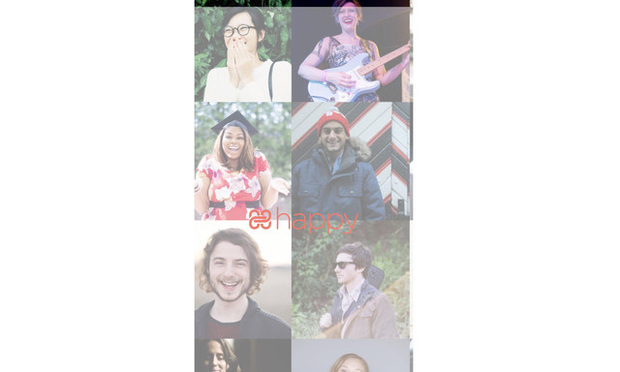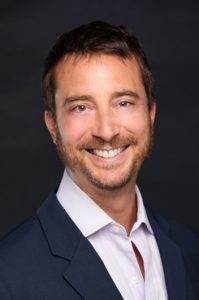Want to Be Happy? There's an App for That
A Big Law refugee has created an app to bring compassion to law firms.
June 14, 2019 at 01:56 PM
4 minute read
 The Happy app, created by former Big Law attorney Jeremy Fischbach, connects users with “compassionate listeners.”
The Happy app, created by former Big Law attorney Jeremy Fischbach, connects users with “compassionate listeners.”
As a Big Law attorney based in New York, Jeremy Fischbach says he had a front-row seat to a mental health crisis.
“I would say that 95% of the lawyers I knew were unhappy. Two-thirds or more were suffering from isolation, depression or substance abuse,” said Fischbach, who graduated from Princeton University in 2000 with a B.A. in psychology before getting his J.D. from New York University in 2009.
Six years later, Fischbach is a Big Law refugee who practices law in New Orleans, working for the alternative, virtual legal service provider InCloudCounsel. But on the side, he has launched an app designed to help lawyers cope with their mental health issues, offering them a sorely needed compassionate ear—something not easily found at law firms.
The app, appropriately enough, is called “Happy.”
“Happy” connects users with more than 2,000 peers who are trained to be “compassionate listeners,” Fischbach says. It prompts users to specify why they're calling—financial troubles, interpersonal issues, work—and then they are guided to call in and speak with a listener. Calls are confidential and are not recorded, although listeners are often polled to see how the call went and what time of day the call was made. The app is available to everybody, not just attorneys, although Fischbach said several attorneys work as listeners for the company and the six years he spent in Big Law made him realized that lawyers are one group that could most benefit.
“In law firms, you have a high amount of stress and isolation,” Fischbach said. “The mantra is, keep your head down, shut up and keep billing. You're creating a recipe for mental health issues. You're saying we're going to drastically limit the time outside the firm, and, while you're inside, we'll put you in a high-stress environment.”
 Jeremy Fischbach
Jeremy FischbachBut emotional connection is a fundamental need, like food, says Fischbach, citing more than a dozen academic studies. And at law firms, where are you going to fulfill that need, he asks, if you spend all day at the office?
According to Fischbach's data, users report a 49% decrease in stress and anxiety, and 93% of users say they felt happier after a conversation with a listener. Some experts have criticized the app as potentially harmful, as listeners have little formal training. But Fischbach said the company has a stringent vetting process and negative ratings quickly sift out poor listeners.
The idea for Happy first came together in 2016, and after spending much of 2017 building out the technology and recruiting support providers, the app went live in 2018.
One year after Happy's release, the company has already partnered with the American Heart Association and with the insurance companies Aetna and United Healthcare. Fischbach now has his eye on the market that inspired him to create the app in the first place: law firms.
He says he has had ”encouraging conversations” with several firms that want to roll out the app firmwide, although he would not specify which firms. He also says his app will be a practical option for attorneys who won't take time out of their day for an appointment with a mental health professional, or who are worried about the repercussions of seeking help.
Additionally, he says “Happy” could train attorneys to be more empathetic listeners so that they can better support their colleagues.
“Our call volume actually goes up at night when other options are less available,” he said. “And talking to peers—everyday people—does a lot to reduce stigma, which is a huge obstacle.”
Similar Stories:
Introducing Minds Over Matters: A Yearlong Examination of Mental Health in the Legal Profession
Is the Legal Industry Ready for a Culture Shift on Mental Health?
This content has been archived. It is available through our partners, LexisNexis® and Bloomberg Law.
To view this content, please continue to their sites.
Not a Lexis Subscriber?
Subscribe Now
Not a Bloomberg Law Subscriber?
Subscribe Now
NOT FOR REPRINT
© 2025 ALM Global, LLC, All Rights Reserved. Request academic re-use from www.copyright.com. All other uses, submit a request to [email protected]. For more information visit Asset & Logo Licensing.
You Might Like
View All
Law Firms Look to Gen Z for AI Skills, as 'Data Becomes the Oil of Legal'

Law Firms Expand Scope of Immigration Expertise Amid Blitz of Trump Orders
6 minute read
Losses Mount at Morris Manning, but Departing Ex-Chair Stays Bullish About His Old Firm's Future
5 minute read
Trending Stories
- 1Uber Files RICO Suit Against Plaintiff-Side Firms Alleging Fraudulent Injury Claims
- 2The Law Firm Disrupted: Scrutinizing the Elephant More Than the Mouse
- 3Inherent Diminished Value Damages Unavailable to 3rd-Party Claimants, Court Says
- 4Pa. Defense Firm Sued by Client Over Ex-Eagles Player's $43.5M Med Mal Win
- 5Losses Mount at Morris Manning, but Departing Ex-Chair Stays Bullish About His Old Firm's Future
Who Got The Work
J. Brugh Lower of Gibbons has entered an appearance for industrial equipment supplier Devco Corporation in a pending trademark infringement lawsuit. The suit, accusing the defendant of selling knock-off Graco products, was filed Dec. 18 in New Jersey District Court by Rivkin Radler on behalf of Graco Inc. and Graco Minnesota. The case, assigned to U.S. District Judge Zahid N. Quraishi, is 3:24-cv-11294, Graco Inc. et al v. Devco Corporation.
Who Got The Work
Rebecca Maller-Stein and Kent A. Yalowitz of Arnold & Porter Kaye Scholer have entered their appearances for Hanaco Venture Capital and its executives, Lior Prosor and David Frankel, in a pending securities lawsuit. The action, filed on Dec. 24 in New York Southern District Court by Zell, Aron & Co. on behalf of Goldeneye Advisors, accuses the defendants of negligently and fraudulently managing the plaintiff's $1 million investment. The case, assigned to U.S. District Judge Vernon S. Broderick, is 1:24-cv-09918, Goldeneye Advisors, LLC v. Hanaco Venture Capital, Ltd. et al.
Who Got The Work
Attorneys from A&O Shearman has stepped in as defense counsel for Toronto-Dominion Bank and other defendants in a pending securities class action. The suit, filed Dec. 11 in New York Southern District Court by Bleichmar Fonti & Auld, accuses the defendants of concealing the bank's 'pervasive' deficiencies in regards to its compliance with the Bank Secrecy Act and the quality of its anti-money laundering controls. The case, assigned to U.S. District Judge Arun Subramanian, is 1:24-cv-09445, Gonzalez v. The Toronto-Dominion Bank et al.
Who Got The Work
Crown Castle International, a Pennsylvania company providing shared communications infrastructure, has turned to Luke D. Wolf of Gordon Rees Scully Mansukhani to fend off a pending breach-of-contract lawsuit. The court action, filed Nov. 25 in Michigan Eastern District Court by Hooper Hathaway PC on behalf of The Town Residences LLC, accuses Crown Castle of failing to transfer approximately $30,000 in utility payments from T-Mobile in breach of a roof-top lease and assignment agreement. The case, assigned to U.S. District Judge Susan K. Declercq, is 2:24-cv-13131, The Town Residences LLC v. T-Mobile US, Inc. et al.
Who Got The Work
Wilfred P. Coronato and Daniel M. Schwartz of McCarter & English have stepped in as defense counsel to Electrolux Home Products Inc. in a pending product liability lawsuit. The court action, filed Nov. 26 in New York Eastern District Court by Poulos Lopiccolo PC and Nagel Rice LLP on behalf of David Stern, alleges that the defendant's refrigerators’ drawers and shelving repeatedly break and fall apart within months after purchase. The case, assigned to U.S. District Judge Joan M. Azrack, is 2:24-cv-08204, Stern v. Electrolux Home Products, Inc.
Featured Firms
Law Offices of Gary Martin Hays & Associates, P.C.
(470) 294-1674
Law Offices of Mark E. Salomone
(857) 444-6468
Smith & Hassler
(713) 739-1250










